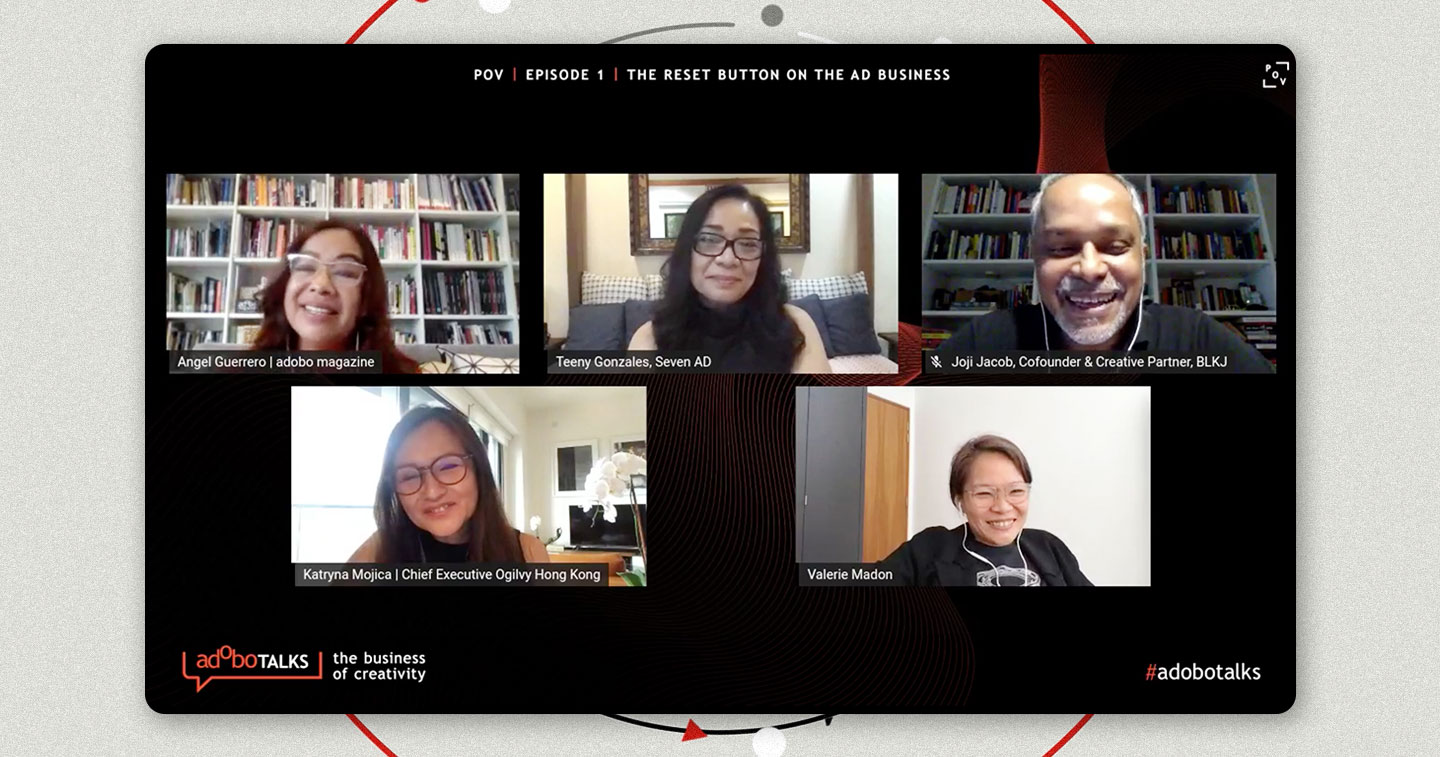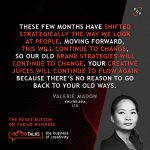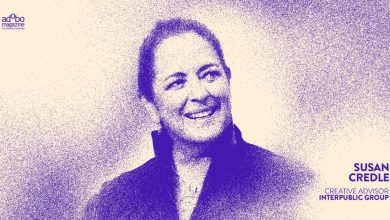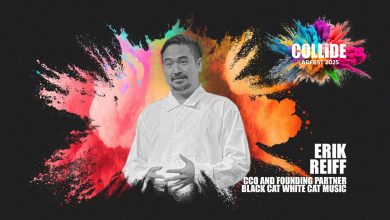MANILA, PHILIPPINES — With the COVID-19 crisis impacting the ad industry, business must evolve beyond advertising to be relevant for today and for the future as consumer’s needs and experiences change.
This was one of the main takeaways at “POV: The Reset Button on the Ad Business”, the pilot episode of adobo Talks #TheBusinessofCreativity that saw a roundtable of Asia’s most distinguished ad leaders who discussed the future of the advertising world post-pandemic.
adobo magazine editor-in-chief Angel Guerrero served as moderator for the digital forum that featured Teeny Gonzales, CEO and Chief Creative Officer of Manila-based agency Seven A.D., Joji Jacob, co-founder of independent agency BLK J in Singapore, Valerie Cheng Madon, Chief Creative Officer at VMLY&R based in Singapore, and Katryna Mojica, Chief Executive for Ogilvy Hong Kong.
The industry veterans highlighted the present challenges their agencies faced as the pandemic hit various regions and lockdowns in their respective countries. They also shared how they navigate a new dynamic with clients whose businesses have been directly affected by COVID-19.
Watch the full roundtable on Facebook or YouTube:
Singapore-based Madon likened the industry atmosphere to animals scavenging during wintertime as they sent pitches non-stop. With clients in travel-related businesses and other industries frozen, Madon’s agency lost the luxury of choosing projects to pitch for — and that the sentiment quickly became about “hunting for everything you can grab.”
Meanwhile, Mojica shared that when COVID-19 hit Hong Kong, the public was more prepared and immediately knew what to do, having learned their lessons from SARS 17 years ago. The Ogilvy chief emphasized the importance of diversifying accounts and “planning for the worst”, as one gets used to the uncertainty of the situation and the changing landscape.
When it comes to the disruptions their teams had to face, Jacob said that their company had resolved to talk to their people every day to keep tabs on their situation and inform staff on their situation. In spite of hard-hit clients, their agency dispersed staff to other teams internally in order to keep them on board without the need for retrenchment or pay cuts. Madon shared the same sentiments, adding that their team had learned to define people’s roles better and add more functions or skill sets.
On the other hand, Gonzales shared that their agency took more proactive steps in ensuring that their team was mentally and physically fit. They hosted sessions with psychiatrists and physical health trainers to boost team members’ morale while on WFH and help them cope with the effects of the crisis.
The industry leaders also discussed how the present situation has affected the dynamic and relationship between agency and client. Jacob noted that this was an opportunity for agencies to reclaim their rightful position as true partners and exhibit empathy. Gonzales shared similar sentiments, noting that her agency was committed to being a genuine partner to their client — by supporting them and being considerate with the challenges they face.
In supporting their clients, Madon mentioned helping them change the course of their business and getting them to try and experiment with new business models. Mojica, on the other hand, stressed that it was important for brands to plan across various time frames, studying how they can be relevant now and in the future amid evolving needs and situations.
When asked about the power of creativity and its ability to help the industry emerge from the crisis, Gonzales stated that creativity not only keeps the industry safe but essential in helping brands send critical messages out to support the human race and keep the world going. Meanwhile, Madon cited the industry’s ability to adapt, such as now being able to pitch in other countries without the need to fly, and that tighter confines, as well as a smaller budget and timetable, required more creativity.
Each panelist also showcased an example of campaigns that were deployed during the lockdown.
With Taiwan as one of the earliest countries to introduce lockdown measures, couples were forced to celebrate Valentines Day quarantined at home. Ogilvy Hong Kong helped IKEA Taiwan leverage the brand promise of bringing joy to the home through its “Love Collection”, by shining the spotlight on “least loved items” and providing light relief to those stuck indoors.
Meanwhile, Singapore’s circuit breaker ordered people to stay home and for public commercial centers to close for the time-being. BLK J, in partnership with the Infocomm Media Development Authority, took one of Singapore’s oldest wet markets, Tekka Market and brought them online, with stall vendors selling their produce to regular and new customers alike via livestreaming.
VMLY&R Asia pulled off a phenomenally successful quarantine campaign in India, riffing off of the success of TikTok as the world was on lockdown. Indian hot oil brand Parachute introduced their own TikTok challenge called “Champi Beats”, inspired by Champi, the traditional head massage in India. The campaign tapped India’s most popular TikTok influencers and eventually racked up 27 billion views with 7.8 million videos created.
With the Philippines on one of the world’s longest lockdowns, families are compelled to stay at home for longer, spending extended periods of time with their children. Leveraging their brand values of family and spending quality time with loved ones, Seven A.D. helmed “Purpose”, a heartwarming spot from the point-of-view of a child cherishing every moment indoors with mom and dad.
Here are the top ten takeaways from the roundtable:
- We can do a lot of business without flying around and chalking up heavy costs. You can pitch in other countries without going there.
- Experiment with new business models, see what works in these new times. You can’t keep doing the same thing anymore — try, test, learn, and move fast.
- With what clients are going through, we need to come up with ideas that are focused on short-term conversion and immediate results.
- In adjusting to a new remote work set-up, it’s important to make sure the team is fit not just to do the work but to cope with the crisis.
- This is the opportunity to demonstrate to clients that we are genuine partners — through the good and the bad times.
- We will have more conversations on creativity — how it stays relevant and evolves with people’s needs. When everything is being disrupted, you need creativity in thinking.
- Strong brands weather a crisis better than weak ones — history has shown that strong brands come back stronger and grow their share.
- This is a time when it is important to know your brand’s purpose, to be able to connect much better with customers in an authentic and distinctive way.
- Go beyond advertising and get into our client’s businesses and processes. Look at digitalisation and emerging data that could have major implications for different sectors.
- We learn more empathy towards our clients, ourselves and our people. If anything, that will be the reset button.
About adobo Talks
adobo Talks is a series of insightful and educational sessions where we take a closer look at how creativity inspires and unleashes inventive solutions. Here, we look at creativity that not only delights and astounds, but more importantly, drives innovation and growth. Each episode, we gather some of the region’s most creative minds in a provocative and thoughtful conversation, and listen to their point of view as we pick their brains and probe creative solutions for the real world.
adobo Talks introduces its first regularly programmed live series, Point Of View — where we spark rousing dialogues on the most pressing and current business issues today.














